ALL THE RAGE
The Bed-Stuy Boxing Center in Brooklyn is the dramatic setting for On the Ropes, Nanette Burstein and Brett Morgen’s transfixing digital video tale of four individuals whose life hopes are pinned on boxing. Bennett Miller (The Cruise) speaks with the directors about their dramatic approach to making documentaries.
Trainer Harry Keitt
Brett Morgen: This whole video-to-film thing raises so many issues.
Bennett Miller: Like what?
Morgen: Like, will there be more bad films now?
Nanette Burstein: I think it’s a combination. Basically, the technology makes filmmaking more accessible to everyone. The downside is that the IFFM [Independent Feature Film Market], which is already a nightmare, is going to be purgatory because everyone is going to make a film. But at the same time, people who do have a vision, first-time filmmakers who wouldn’t be able to get money but have a really interesting story to tell, can just go out and do it. And they can capture a certain intimacy that’s harder to capture with film.
Morgen: It’s ironic, though, because people are all talking about the digital video revolution the same way they were talking about cinema verité in 1960. Somewhere along the line, Kodak screwed it up for all of us with the high cost of film because you can shoot on film stocks with the same amount of light needed for video. I got into an argument with someone who said, "Well, I shoot on video because I don’t need a lot of light." Have you seen the new film stocks? You don’t need a lot of light!
Miller: Frankly, I’m sick of all this digital talk.
Morgen: Bennett Miller is the godfather of the digital revolution!
Miller: Blah, blah, blah. So, what was it that originally compelled you to to make On the Ropes?
Burstein: I was actually training at the boxing gym, and Harry was my trainer. I got to know him really well, and I thought he was a really fascinating person. And then I got to know Tyrene. I went to her house and saw the situation she lived in, and how much she wanted to get out. That whole scene at the gym... these people had dreams but they had every obstacle against them. That was something I really wanted to capture.
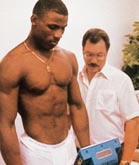 | 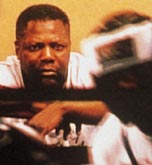 | 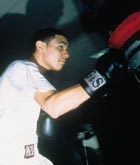 |
| Left to Right: George Walton weighs in; Harry Keitt; Noel Santiago | ||
Miller: For me, On the Ropes is a great documentary because it allowed me to enter a world I knew only by reputation and discover a humanity within it. We see these people deeply enough so that we care. I became emotionally invested and was able to identify with these people whose lives are very different from my own.
Morgen: This isn’t a ghetto film or an inner-city film. It’s a film about the human spirit. It’s a film about betrayal, dignity, and redemption. It deals with a lot of universal themes. In the story of the trainer, Harry Keitt, there are elements that are totally Shakespearean, and I think that’s what really grabs people.
Burstein: Also, [in On the Ropes] you’re watching these people go through these dramas. The film is not just interviews in which people are telling you what they’re about. Much of it is verité-style, and yet there’s a three-act structure – a beginning, middle and end.
Miller: Do you think this film represents any sort of departure from traditional documentaries?
Morgen: Aesthetically, I think our film is almost too traditional. This is a film that definitely pays homage to our forefathers, those who inspired us.
Burstein: It’s very traditional in the way it was shot. I think one thing that sets us apart from other documentary filmmakers is that we are completely conscious of the three-act structure. Shooting the film, we would say, "Okay, we’re in the second act now, and we have to make sure we shoot this and this and this. And how is the third act going to unfold?" I don’t know if most people think of making documentaries that way. Certainly not in the verité films of the ’70s.
Morgen: The scene where Harry returns from the gym illustrates our directing sensibilities. We tried to be present for all the action in the film because we didn’t want any talking head interviews or any exposition. We wanted everything to be in the present tense. Except, the moment Harry got fired, we weren’t there. We were on a plane to New York. Our whole narrative was leading up to this moment, and we weren’t there to capture it. So how do we present this scene? We came up with the idea of having him open the gym. So if you want to talk about the idea of staging, yes, we had to get inside the gym before Harry opened it up and put our camera there. And we specifically talked about shooting it primarily in silhouettes. We thought it should be very moody. We talked to Harry and sort of directed him, to the point of making sure mentally he was where we were with the scene. We basically storyboarded that scene.
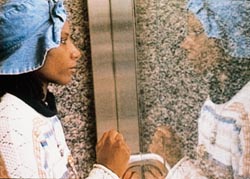 |
| Tyrene Manson in On The Ropes |
Morgen: We knew the first two acts. With Harry and George, we knew that we were going to follow that relationship. And we’re thinking, are things going to fall apart? What are we filming? You have to have an angle and a point of view. We had a really strong idea about what the first two acts of the film would be, but we had no idea what the third act would be, where the stories would end. The thing is, you don’t know when you set out, but I think you should have a map as to where you want to go. When we make documentary films, I don’t feel that we’re just passive observers floating down the stream with the characters. You have an idea of where you want to go and you make sure you get there.
Miller: At the same time, do you feel in any way that the movie revealed itself to you in the process of its making in a way that you didn’t expect?
Burstein: I don’t think it did, no.
Morgen: I don’t think so. Our first treatment before we began production is very close to what the final film is. I think it’s foolish to go into production with a subject and not know where you want to take it. A lot of people think you can just go in and collect footage. I look at someone like Todd Phillips, who I think is doing some of the best work – although, I guess we lost him to Hollywood – but you look at Frathouse, and that film is fucking directed. And what’s great about that film is that it’s directed. If you watch a lot of television documentaries, there’s a producing credit but no directing credit. I think that documentaries are not directed enough.
Miller: Brett, didn’t you just tell me you weren’t the trailblazing type?
Morgen: No, we are trailblazers. There are two elements that I think we employ that actually are fresh to the genre. I think the score by Teddy Shapiro and Web Dee is very cohesive. It creates punctuation points and underlines the action along the way. And it doesn’t just go underneath, it sits on top a lot of the time. And in our mix, there were a lot of scenes where we would actually raise the music above the dialogue, where Teddy was telling a story, creating the emotional vibe of this film. That’s been done in a lot of documentaries, I’m not going to sit here and say we are the first documentary to employ music. But when you think of the purity of cinema verité, they certainly didn’t employ a score the way we did. I know Brother’s Keeper and Hoop Dreams did.
Miller: With regard to the concept of directing documentaries, you chose to keep the focus on the human beings — their struggles — and not simply the "issues" their lives might represent to some people. To me that’s the mark of a documentary director even more than the aesthetic control you exercised. This could have very easily become a political film, but you took it much deeper than that. Of course, the film does have political undertones but they are the by-product of human dramas and not the bottom line. And on top of all that, it’s also entertaining.
Morgen: That’s funny, because I always tell people that we set out to make a really entertaining film, and it became a social issue documentary by accident.
Burstein: We didn’t have a political agenda at all. We were just interested in the subjects because of who they were and what they were going through. The universal truths that came up could have been in any situation. We could just have easily have gone and filmed in a small town in Texas in a high school.
Miller: I think it’s the admission of some of the less venerable qualities of some of these characters that generates compassion for them and an understanding of their situation.
Morgen: I think the film ultimately has a nihilistic sensibility to it. Harry wants to climb out of the gutter so bad, but at the end of the film he’s back where he was at the beginning. He’s not really any closer to achieving his dreams.
Burstein: For us, it was very conscious in our minds that we wanted to entertain people with this film. I think our future projects will probably not take on such serious subject matter.
Miller: Really?
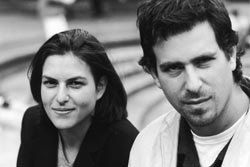 |
| Filmmakers Nanette Burstein and Brett Morgen |
Miller: It just gets back to the question of truth.
Burstein: There is no truth in documentary as soon as you put a camera in the room.
Miller: True.
Morgen: I disagree with both of you. There is a truth. Truth exists in all art, whether it’s fiction or non-fiction, and it’s "Does this scene feel honest to me?" You know, Brecht and Godard aside, when I see a Hollywood film, the moment that I start to feel that it’s manipulative or forced, or something doesn’t feel real or authentic, that’s where the film collapses.
Miller: Also true.
Burstein: It’s all about your definition of truth. Todd was still going for a truth. It’s still honest what he’s saying.
Morgen: A film like 20 Dates, which is this pseudo-documentary, held no truth for me. I just felt that everything was manipulated, and as a result I was lost in the sauce from the second the film began. I didn’t trust the filmmaker, I did not trust what he was doing to me. In both documentary and fiction, when you start to feel manipulated, then the walls start to come down. So what’s so upsetting about the controversy around Frathouse is that the same people who praised that film are now tearing it down. And, yes, I can’t tell a story about a Nicaraguan drug dealer and have you play the drug dealer and sell it as the truth. But ultimately, when those people saw it at Sundance, they dug that film and it resonated with them. And I don’t understand why that should be any different at this point. If I found out that Speed Levitch really wasn’t a tour bus guide, it wouldn’t matter. I wouldn’t care. The Cruise is still a great film.
Miller: For the record, he was a real tour bus guide! What’s really funny to me are these little debates I would learn about that cropped up in places like Seattle and Minneapolis — little rumors that Speed wasn’t real but an actor, or something. I suppose I agree with you that it doesn’t really matter that much what the "truth" is. But again, for the record, Speed Levitch was real.
VOD CALENDAR


 See the VOD Calendar →
See the VOD Calendar →

